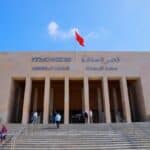Kinshasa, 7 March 2016 – Defending the rights of victims of injustice and exercising one’s fundamental freedoms remains a challenge in DR Congo. Faced with an often failing legal system and, at times, intimidation, men and women still pursue an ideal: to live in a fairer world. Second of three interviews: journalist Nathalie Kapela, specialised in covering justice matters.
Born in Kinshasa, Nathalie Kapela has a background in communication and has been active in the field of information since 2000. She is very quickly interested in sensitive issues such as overexploitation of forests and the lack of respect for legislation in this area. However the Congolese media lacks resources: 80% of television and radio channels are commercial and therefore dependent on advertisers, or are supported by politicians. “Under these kind of conditions it quickly becomes problematic to tackle committed issues“, explains Nathalie Kapela.
The young woman’s interest in legal issues was confirmed during the production of a TV report in a township on the outskirts of the Congolese capital city. “I was shocked when I discovered how precarious the living conditions were. The discrepancy between what I was telling people on air and the reality on the ground was enormous“, the journalist and anchorwoman tells. She decided to leave the television company who employed her and devote herself instead to human rights and good governance issues.
In 2008, she set up her own video production company. Her first report focused on corruption in the judiciary. “I wanted to show that anyone who breaks the law, whether rich or poor, should be punished“, she recollects.
The reports produced for her programme Actualité judiciaire (The Judiciary Today) are being broadcast on television, thanks, in particular, to international financing. She then took the administrative steps in order to protect the concept of her programme but very soon noticed how obstacles were put in her way, up to ministerial level. “I therefore decided to denounce this situation on air. After that, it’s as though I’ve been hit by a thunderbolt: my programme was suspended!” In the face of this suspension, the journalist filed a complaint with the Conseil Supérieur de l’audiovisuel et de la communication (High Council for Audio-visuals and Communications). But this was unsuccessful, in spite of public support from a number of European countries. “Subsequently, I was summoned for false accusation. I even received threats by text messages on my mobile phone“, testifies Nathalie Kapela.
Today, her request to withdraw the suspension of her programme is pending before the Supreme Court. “Since 2014, ASF has supported me with two lawyers who are pursuing the matter at Court level“, explains the journalist, who, in the intervening time, has been producing new reports for other TV channels.
Whilst waiting for a court decision, Nathalie Kapela continues with her fight, in spite of the pressure and the intimidation to which she and her team are subjected. “What do I fear the most? Not seeing my goal being achieved: living in a country without injustice. Because here, the poverty is striking and corruption is an everyday practice. But with our programmes, the legal culture is making progress. People are keeping themselves informed, they are being responsive. It’s this conviction,that things will change in favour of observing human rights, that keeps me going.”
Picture: Freedom of press in DR Congo remains a challenge. Kinshasa, 2015 © ASF / G. Van Moortel



